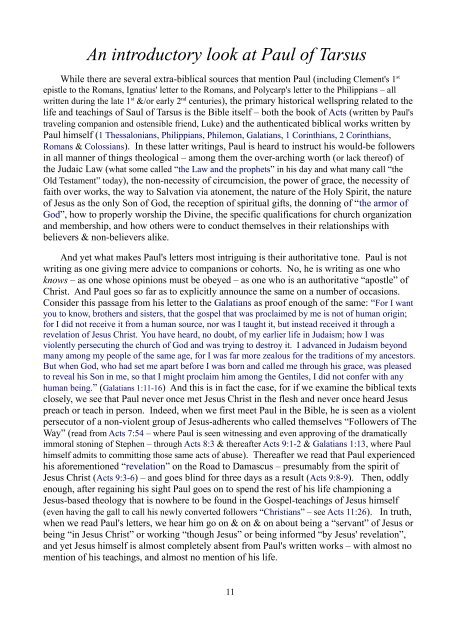The Cult of Paul
an exhaustive biblical examination of the starkly contrasting lives, values, & theologies of Jesus Christ and Paul -- Jesus' most zealous “apostle,” and the true father of the modern-day Christian church
an exhaustive biblical examination of the starkly contrasting lives, values, & theologies of Jesus Christ and Paul -- Jesus' most zealous “apostle,” and the true father of the modern-day Christian church
You also want an ePaper? Increase the reach of your titles
YUMPU automatically turns print PDFs into web optimized ePapers that Google loves.
An introductory look at <strong>Paul</strong> <strong>of</strong> Tarsus<br />
While there are several extra-biblical sources that mention <strong>Paul</strong> (including Clement's 1 st<br />
epistle to the Romans, Ignatius' letter to the Romans, and Polycarp's letter to the Philippians – all<br />
written during the late 1 st &/or early 2 nd centuries), the primary historical wellspring related to the<br />
life and teachings <strong>of</strong> Saul <strong>of</strong> Tarsus is the Bible itself – both the book <strong>of</strong> Acts (written by <strong>Paul</strong>'s<br />
traveling companion and ostensible friend, Luke) and the authenticated biblical works written by<br />
<strong>Paul</strong> himself (1 <strong>The</strong>ssalonians, Philippians, Philemon, Galatians, 1 Corinthians, 2 Corinthians,<br />
Romans & Colossians). In these latter writings, <strong>Paul</strong> is heard to instruct his would-be followers<br />
in all manner <strong>of</strong> things theological – among them the over-arching worth (or lack there<strong>of</strong>) <strong>of</strong><br />
the Judaic Law (what some called “the Law and the prophets” in his day and what many call “the<br />
Old Testament” today), the non-necessity <strong>of</strong> circumcision, the power <strong>of</strong> grace, the necessity <strong>of</strong><br />
faith over works, the way to Salvation via atonement, the nature <strong>of</strong> the Holy Spirit, the nature<br />
<strong>of</strong> Jesus as the only Son <strong>of</strong> God, the reception <strong>of</strong> spiritual gifts, the donning <strong>of</strong> “the armor <strong>of</strong><br />
God”, how to properly worship the Divine, the specific qualifications for church organization<br />
and membership, and how others were to conduct themselves in their relationships with<br />
believers & non-believers alike.<br />
And yet what makes <strong>Paul</strong>'s letters most intriguing is their authoritative tone. <strong>Paul</strong> is not<br />
writing as one giving mere advice to companions or cohorts. No, he is writing as one who<br />
knows – as one whose opinions must be obeyed – as one who is an authoritative “apostle” <strong>of</strong><br />
Christ. And <strong>Paul</strong> goes so far as to explicitly announce the same on a number <strong>of</strong> occasions.<br />
Consider this passage from his letter to the Galatians as pro<strong>of</strong> enough <strong>of</strong> the same: “For I want<br />
you to know, brothers and sisters, that the gospel that was proclaimed by me is not <strong>of</strong> human origin;<br />
for I did not receive it from a human source, nor was I taught it, but instead received it through a<br />
revelation <strong>of</strong> Jesus Christ. You have heard, no doubt, <strong>of</strong> my earlier life in Judaism; how I was<br />
violently persecuting the church <strong>of</strong> God and was trying to destroy it. I advanced in Judaism beyond<br />
many among my people <strong>of</strong> the same age, for I was far more zealous for the traditions <strong>of</strong> my ancestors.<br />
But when God, who had set me apart before I was born and called me through his grace, was pleased<br />
to reveal his Son in me, so that I might proclaim him among the Gentiles, I did not confer with any<br />
human being.” (Galatians 1:11-16) And this is in fact the case, for if we examine the biblical texts<br />
closely, we see that <strong>Paul</strong> never once met Jesus Christ in the flesh and never once heard Jesus<br />
preach or teach in person. Indeed, when we first meet <strong>Paul</strong> in the Bible, he is seen as a violent<br />
persecutor <strong>of</strong> a non-violent group <strong>of</strong> Jesus-adherents who called themselves “Followers <strong>of</strong> <strong>The</strong><br />
Way” (read from Acts 7:54 – where <strong>Paul</strong> is seen witnessing and even approving <strong>of</strong> the dramatically<br />
immoral stoning <strong>of</strong> Stephen – through Acts 8:3 & thereafter Acts 9:1-2 & Galatians 1:13, where <strong>Paul</strong><br />
himself admits to committing those same acts <strong>of</strong> abuse). <strong>The</strong>reafter we read that <strong>Paul</strong> experienced<br />
his aforementioned “revelation” on the Road to Damascus – presumably from the spirit <strong>of</strong><br />
Jesus Christ (Acts 9:3-6) – and goes blind for three days as a result (Acts 9:8-9). <strong>The</strong>n, oddly<br />
enough, after regaining his sight <strong>Paul</strong> goes on to spend the rest <strong>of</strong> his life championing a<br />
Jesus-based theology that is nowhere to be found in the Gospel-teachings <strong>of</strong> Jesus himself<br />
(even having the gall to call his newly converted followers “Christians” – see Acts 11:26). In truth,<br />
when we read <strong>Paul</strong>'s letters, we hear him go on & on & on about being a “servant” <strong>of</strong> Jesus or<br />
being “in Jesus Christ” or working “though Jesus” or being informed “by Jesus' revelation”,<br />
and yet Jesus himself is almost completely absent from <strong>Paul</strong>'s written works – with almost no<br />
mention <strong>of</strong> his teachings, and almost no mention <strong>of</strong> his life.<br />
11

















